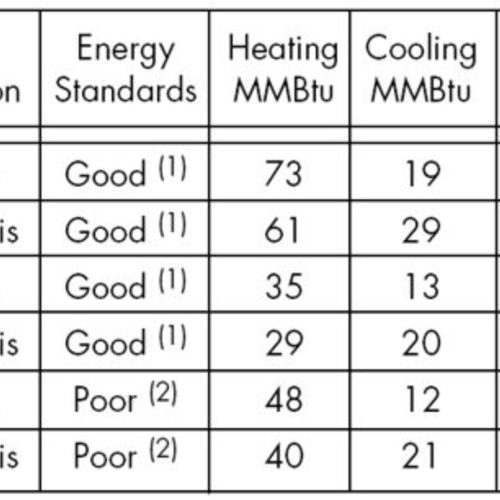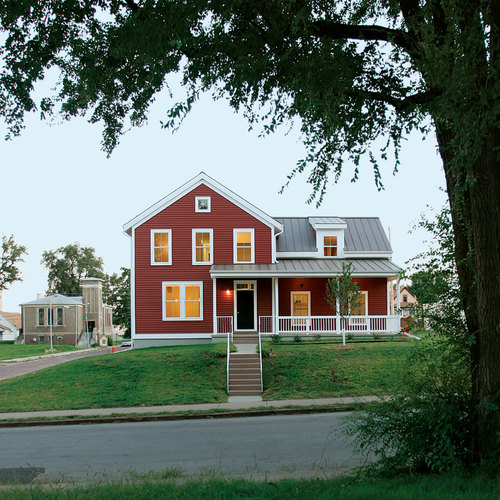As you know, I posted a survey the other day asking for feedback from folks who use Green Building Advisor
. At the end of the survey I asked a couple of open-ended questions in order to get some comments. While not nearly enough of you have filled out the survey (if you don’t vote, you can’t complain), a couple of good comments came in. Thanks for filling out the survey and sharing your thoughts with us.
One comment, I think, can make a good conversation starter.
It criticized us for being unjustifiably critical in terms of payback assessment of some energy-related solutions, and that we don’t have enough good info on solar thermal.
The reader says,
“Payback scenarios are fleeting and mostly a lot of rubbish to begin with…” and that we “hardly ever address solar thermal (like solar hot water space heating), and even criticize it, again for bad ‘payback.’ ”
So what is the cost of building green? Some folks, like Bill Reed
, say that if you go far enough you can practically tunnel through the cost barrier — that you can build a superior house for the same cost as a regular house, or even less.
Some of the houses in our Green Homes section list sq. ft. prices that are very much in line with what people think is the “right” square foot price—$100/sq. ft. (the same price as when I was framing houses 15 years ago).
Some examples from our Green Homes section illustrate that you can spend as much (or as little) as you want to spend. These homes are very high performing homes—the kind with extremely small utility bills.
New construction:
$94/sq. ft. — The First U.S. Passive House Shows That Energy Efficiency Can Be Affordable
$96/sq. ft. — Super Energy-Efficient Home in Vermont
$150/sq. ft. — Teenagers Build an Affordable LEED-Platinum Home
$196/sq. ft. — Vermont LEED Platinum Home
$230/sq. ft. — Sustainable Spec House in Coastal Maine Grabs LEED’s Highest Rating
Remodels/retrofits/renovations:
<$50/sq. ft. — Deep Energy Makeover
$126/sq. ft. — Green Renovation: Same Footprint, Twice the Space
$223/sq. ft. — Michigan’s First LEED Platinum Gut-Rehab
$250/sq. ft. — Connecticut’s First LEED Gold Home
We’d love to hear more from our readers on green building costs and payback.
What do _you_ think?
Weekly Newsletter
Get building science and energy efficiency advice, plus special offers, in your inbox.














8 Comments
payback
I personally love the idea of looking at installations and understanding them as an investment. Do I always follow the "wisest choice" by looking at this payback info? No... but it is a great place to start. Just like we don't always spend our money in the most cost effective way in our personal life, right? There are times that every person spends the extra money because we want to - or the inverse - when we don't spend the money even though it looks like a good investment.
I will say that in all these payback analysis - the basics can get lost. PV solar? 12" thick SIP's? GeoThermal loops? All good stuff... but don't forget about the basics (stopping air infiltration, flashing details, proper design for solar orientation, etc...) Many of the best "green" things you can do can be completed for little to no money - you just have to pay attention.
Cost more than what?
Does it cost more than a house where the kids get asthma, there's an electric space heater in the parents' bedroom, the window sills are rotting away, and the dehumidifier in the basement doubles the electric bill?
What do you get when you buy a green home? Clean air, comfort, low operating costs, long term value..? I think the case can be made that building green doesn't have to cost much more than doing otherwise. Seems like a bargain to me.
More than incompetence
Green building does cost more than the crap most of us are willing to accept as construction, just like that solid, well running Toyota costs more than the run-down Yugo with a flat tire. We wouldn't buy electronics, cars, office equipment, or anything else (except perhaps fast food) if it was as badly put together as most homes are. Crap is cheap, competence costs more. If we were to set our standard minimum at competence and quality - meeting codes, manufacturer's installation requirements, and, common sense, basic green building wouldn't cost any more.
It should be about priorities...
I believe green building does generaly cost more for a variety of reasons but it does not have to be so. Of course extra insulation or PV panels add more cost to a house but this in itself does not have to be a problem if the consumer is willing to scale back spending in other areas. How many "green" showhomes are equipped with all the latest gadgetry to allow them to meet certain high standards of efficiency yet are over-large, decked with granite and stainless appliances and all the other expensive luxuries of modern living?
In other words, if building or buying a green home is important to you, then you should be willing to give up some of the un-neccesary luxuries in order to achieve your goals. Easier said than done...
It does cost more...a lot more
I recently received a couple of bids on our new family home design (passive solar, super-insulated, no fancy finishes). The prices were between 50%-75% higher than the average per-sq-ft price for our area. We've done everything we know to simplify the costs (simple roof, four corners, bare bones appliances, lighting, finishes, etc), but apparently it didn't matter. It's amazing to me how many people outside of this website want you to build something other than a "green" home. I'd give one of my toes for a builder who WANTS to build a quality, energy-efficient home without doubling the price. Frustrating...
It does cost more ......a lot more.
Michael, that unfortunately is a corporate mentality rather than a mentality of integrity and morals.
There are far too many out there that want or desire to capitalize on the the hopes, dreams, desires, and reality of the world as it is. These are the same people who would sell you a bottle of water for your first born child if there was a drought. Keep looking! Keep Searching! Keep the Faith! They are out there! Don't know your location, don't know your means - but ask everywhere! It's your if you spend the same amount time figuring out and searching out your builder as you did your home. Some people will travel a long way to build a home they believe in and for a reasonable price.
regards R
It does cost more ... a lot more.
As a consumer, I understand 'non-standard' costs more, but it seems un-reasonable to have similar sized structures, with even 'simpler systems' to cost twice as much. 15% (about 1/8) more is reasonable, so even 25% is stretching my 'economic reality'.
The operation of the building must be close to offsetting the new additional capital cost, hopefully more than offsetting the cost to make 'green' buildings reasonable for real world use.
Now, how can we get 'green buildings' to be the norm rather than the exception?
From what I have seen and read, many of the 'normal materials' are still in use, just the application is different. Or am I under some disustion?
What does it take...
I see much of this as an education problem. ... If contractors just build what architects give them, and architects aren't educated, then consumers are out of the loop. Sometimes we do buy Yugo's when Toyota's, or even Ford's aren't available.
We need to get ALL of us up to speed, and the professionals need to question decisions, materials, of each other and the customer. No, it isn't easy, but like President Kennedy said, 'We are not doing this because it is easy, but because it is hard', and for me, it is the right long term answer. ... Sorry if it sounds like preaching.
Log in or create an account to post a comment.
Sign up Log in